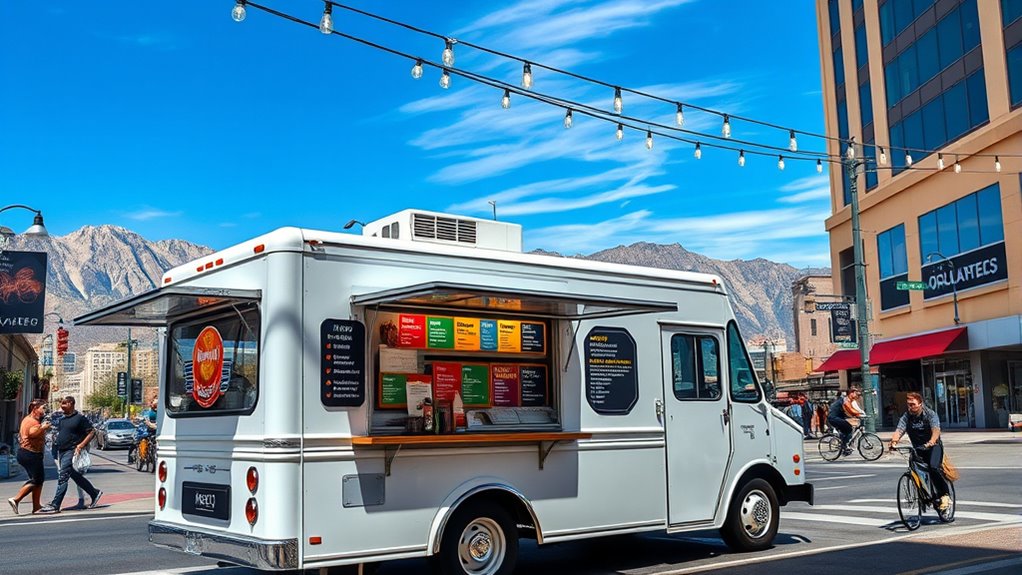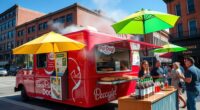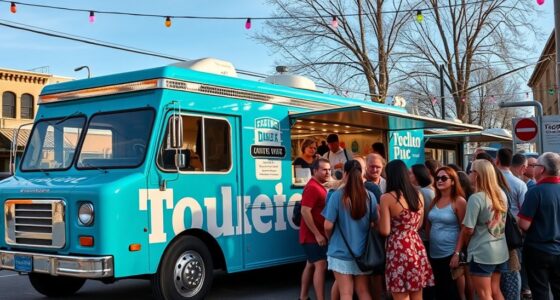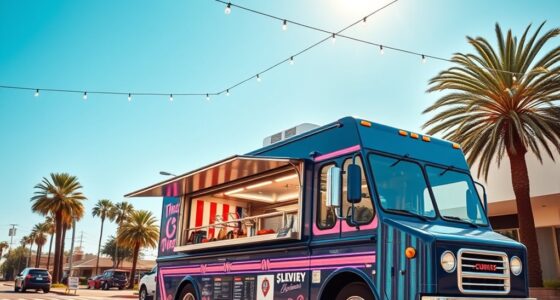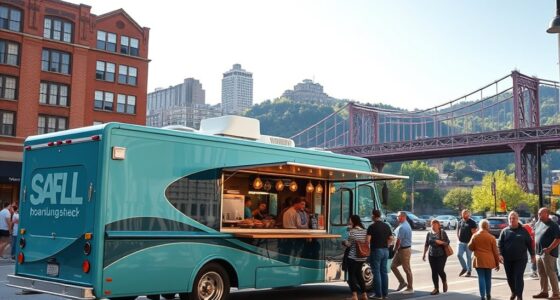To begin a food truck in Reno, NV, you need to research local food trends and community preferences to develop a unique menu. Then, understand city permits, health regulations, and parking zones to guarantee compliance. Set up your operations with a solid budget, secure financing, and choose local, seasonal ingredients. Use technology for efficiency and focus on community engagement for long-term success. Keep exploring for more tips to launch your food truck smoothly.
Key Takeaways
- Conduct thorough market research on Reno’s local food trends and community preferences.
- Obtain necessary permits and licenses from Reno’s city and health departments.
- Develop a menu featuring local ingredients and unique offerings to stand out.
- Engage with the Reno community through events, festivals, and partnerships to build brand presence.
- Create a detailed business plan covering budgeting, financing options, and operational logistics.
Research Local Food Trends

Understanding local food trends is essential before launching your food truck in Reno. By researching the local food trends, you’ll gain insight into what flavors and dishes resonate with the community. The Reno culinary scene is dynamic, blending traditional Nevada favorites with innovative, global influences. Pay attention to popular street foods, seasonal ingredients, and emerging cuisines that attract locals and visitors alike. Visit food festivals, follow local food bloggers, and explore social media to see what’s trending. This will help you develop a menu that appeals to the community’s tastes while standing out in a competitive market. Staying updated on Reno’s culinary scene ensures your food truck remains relevant and appealing, increasing your chances for success.
Understanding Local Requirements
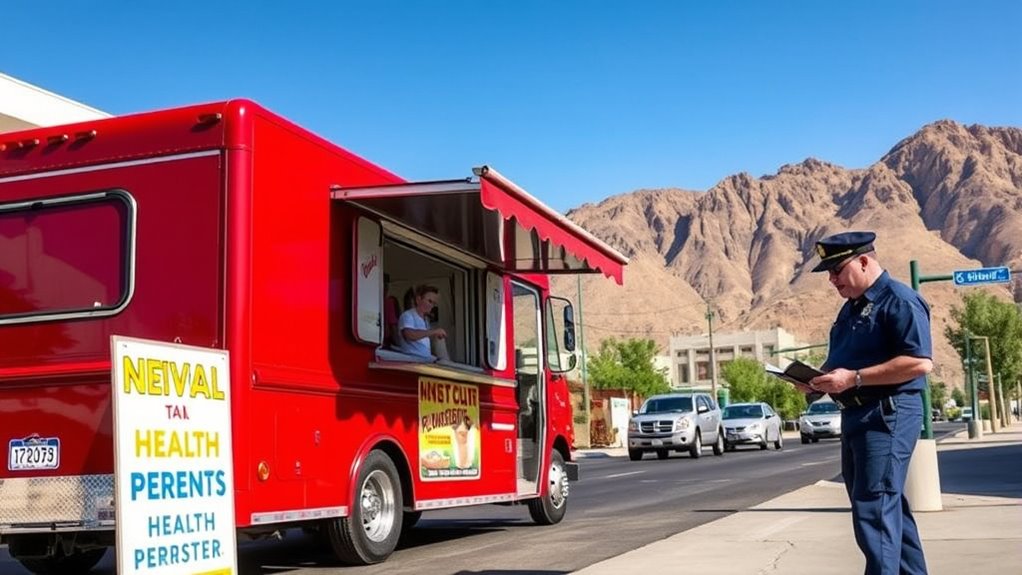
To get started, you’ll need to complete the online permit application process through Reno’s city website. Make sure you comprehend the sanitation procedures and gather all necessary documentation to stay compliant. Additionally, familiarize yourself with designated street parking zones to ensure your truck operates legally and efficiently. Be aware of the regulatory requirements for food trucks, including any specific health and safety standards you must meet.
Online Permit Application Process
Navigating the online permit application process in Reno can seem intimidating, but the city provides a straightforward digital platform to simplify it. You’ll start by creating an account on the city’s online portal, which streamlines submitting your online permit application. Make sure to gather all necessary documents beforehand, such as proof of business registration and relevant certifications. When filling out the application process, double-check each entry for accuracy to avoid delays. The platform guides you step-by-step through each section, making it easier to complete your submission efficiently. Once you submit, you’ll receive confirmation and updates via email. Keep track of your application’s progress through the portal. This online permit system is designed to save you time and minimize the complexities of local government procedures.
Sanitation Procedures and Documentation
Ensuring your food truck meets Reno’s sanitation standards is essential for both compliance and customer safety. You need to implement proper cleaning protocols to prevent contamination and maintain food safety. Document all sanitation procedures, including daily cleaning schedules, equipment sanitization, and pest control measures. Reno requires specific records to verify your compliance during inspections. Use a clear chart to track cleaning tasks and dates, guaranteeing consistency. Here’s an example:
| Task | Frequency |
|---|---|
| Surface cleaning | After every shift |
| Equipment sanitizing | Daily |
| Pest control | Monthly |
Maintaining detailed documentation not only simplifies inspections but also demonstrates your commitment to food safety. Stay updated with local regulations to ensure your sanitation procedures align with Reno’s health standards.
Designated Street Parking Zones
Understanding the designated street parking zones in Reno is essential for operating your food truck legally and efficiently. Knowing where you can park helps you avoid fines and ensures smooth parking enforcement. Pay close attention to street signage indicating parking restrictions and zone boundaries. Some zones may require specific permits or time limits, so check local signage carefully. Parking enforcement actively monitors these areas, so staying compliant keeps your operations running smoothly. To succeed, familiarize yourself with the city’s parking maps and signage to identify legal spots. This knowledge helps you avoid violations and optimize your service locations. Always verify zone designations before parking to ensure you’re within legal boundaries, saving you time and potential penalties.
Setting Up Your Base of Operations
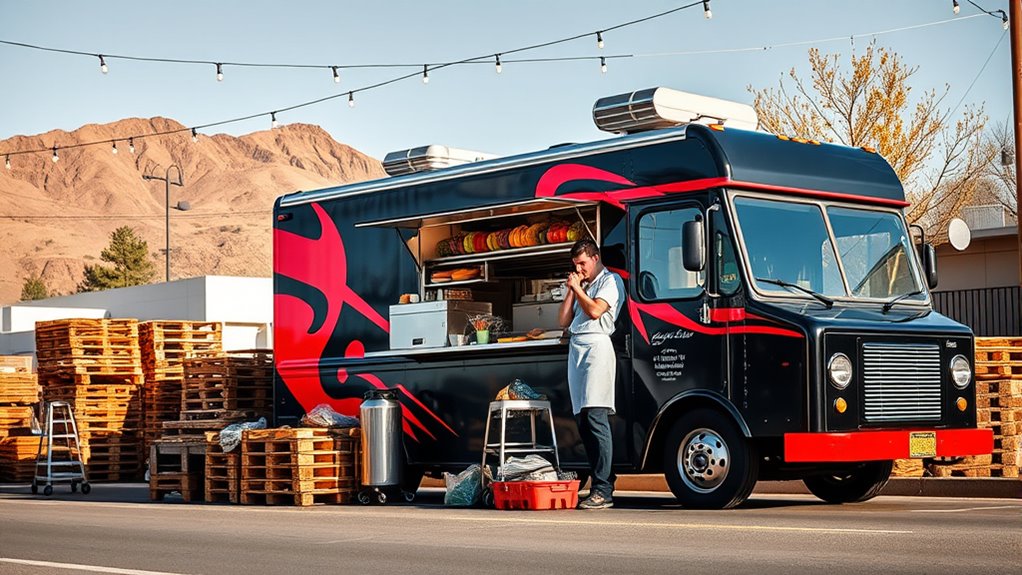
To set up your base of operations, you’ll need to meet shared kitchen licensing requirements and plan a custom kitchen layout that fits your menu. Ensuring your space complies with local health codes is essential for smooth operation. Consider how your kitchen design can optimize workflow and meet all regulatory standards. Recognizing patterns in numbers can help you better understand and navigate the requirements for your setup.
Shared Kitchen Licensing Requirements
Setting up your shared kitchen as your base of operations requires obtaining the appropriate licensing to comply with local health and safety regulations. This involves securing shared kitchen licensing that meets Reno’s standards and understanding the specific kitchen co-op regulations. These rules guarantee your workspace is safe, sanitary, and legally compliant. To get started, you’ll need to:
- Submit detailed plans of your shared kitchen setup
- Pass health inspections based on shared kitchen licensing requirements
- Establish proper sanitation and food storage protocols
- Register with local health authorities for ongoing compliance
Understanding these requirements helps you avoid legal issues and guarantees smooth operations. Staying compliant with shared kitchen licensing and kitchen co-op regulations is vital for launching your food truck business confidently and responsibly.
Custom Kitchen Layout Planning
Designing a custom kitchen layout is a essential step in establishing a functional and efficient base of operations for your food truck business. You need to plan carefully to optimize space for essential kitchen equipment, ensuring everything is within easy reach. Consider how you’ll arrange appliances like grills, fryers, and prep stations to streamline workflow and reduce movement. Storage solutions are equally important; you should incorporate cabinets, shelves, and bins that maximize space and keep ingredients organized. Properly planned storage helps prevent clutter and maintains hygiene standards. Think about the sequence of your workflow, from prep to cooking to cleaning, and design your layout accordingly. A well-thought-out kitchen layout saves time, improves efficiency, and sets your food truck up for success.
Budgeting and Financing Your Food Truck
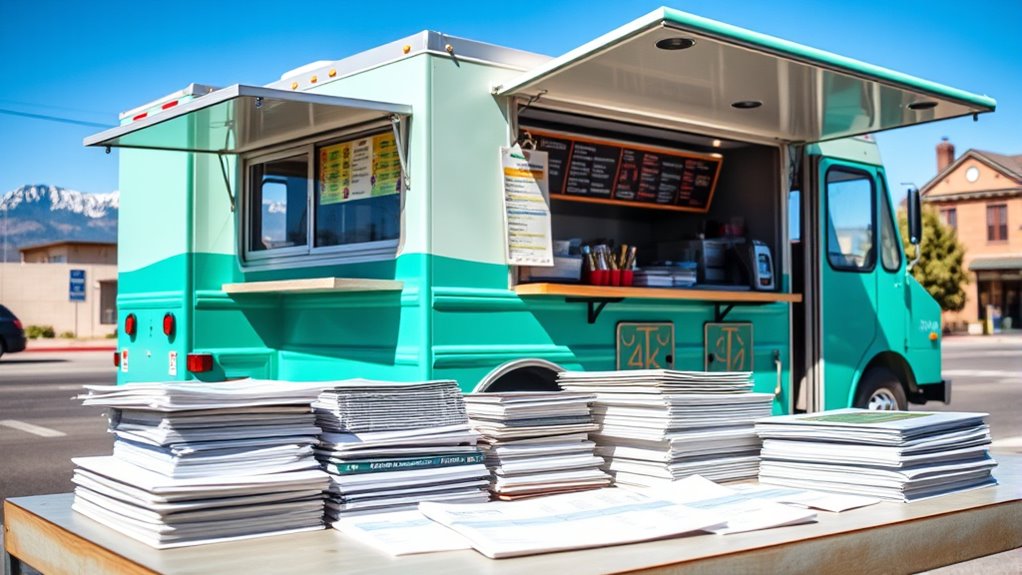
When planning your food truck, you’ll need to contemplate the initial costs of purchasing your vehicle and how to finance them. Small Business Administration loans can be a helpful option to secure funding, but you should also account for ongoing expenses like liability insurance and payroll. Proper budgeting ensures you’re prepared to cover these costs and keep your business running smoothly. Additionally, researching cost-effective strategies such as buying in bulk or seasonal produce can help maximize your budget.
Initial Vehicle Purchase Costs
Purchasing your food truck is a major upfront expense that requires careful budgeting and financing planning. The initial vehicle costs vary based on whether you buy new or used, with prices typically ranging from $20,000 to $100,000. To manage these costs, you’ll need to contemplate vehicle financing options, which can help spread payments over time. Don’t forget to account for insurance requirements, which are essential for legal operation and protecting your investment.
Consider these key points:
- Choosing between new or used trucks
- Securing vehicle financing options
- Budgeting for insurance costs
- Evaluating additional features or modifications
Small Business Administration Loans
Securing a Small Business Administration (SBA) loan can be a smart way to finance your food truck, especially if you’re looking for favorable terms and manageable repayment options. With an SBA loan, you can cover costs like vehicle modifications, equipment, and initial inventory, giving you more flexibility to focus on food truck branding and menu innovation. A strong brand presence is essential to attract customers, and using funds wisely can help you develop a standout menu that sets you apart. SBA loans often come with lower interest rates and longer repayment periods, easing your financial burden as you get started. This financing option provides the capital needed to establish a professional, appealing food truck that emphasizes quality, creativity, and customer engagement.
Liability and Payroll Considerations
Properly budgeting for liability and payroll costs is essential to guarantee your food truck stays financially healthy. Liability insurance protects you from unforeseen accidents or claims, so include it in your expenses. Don’t forget about payroll taxes, which are necessary contributions for your employees’ social security and medicare. Planning for these costs ensures you won’t be caught off guard. To stay on track, consider these points:
- Calculate your liability insurance premiums annually
- Budget for payroll taxes based on your payroll size
- Set aside funds for worker’s compensation insurance
- Factor in overtime pay and employee benefits
Being proactive with these considerations helps maintain your cash flow and reduces potential legal or financial setbacks. Proper planning now means smoother operations and peace of mind later.
Designing Your Menu and Pricing Strategy
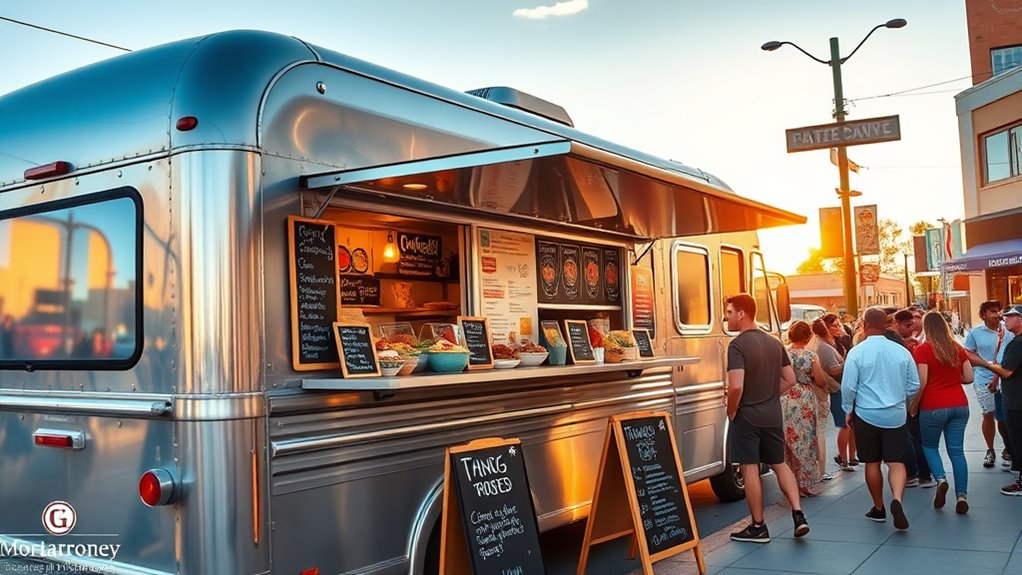
To create a menu that stands out, consider sourcing unique local ingredients that resonate with Reno’s food scene. Balancing ingredient costs while maintaining quality helps you set competitive prices that attract customers. Focusing on both freshness and affordability guarantees your menu appeals and your profits stay healthy. Incorporating local sourcing not only supports the community but also aligns with environmentally sustainable practices.
Unique Local Ingredient Sourcing
Incorporating local ingredients into your menu not only supports nearby farmers and artisans but also sets your food truck apart by offering fresh, authentic flavors. Embrace farm-to-table sourcing and focus on artisanal ingredient selection to highlight Reno’s unique produce, meats, and dairy. This approach appeals to customers seeking quality and locality, giving your menu a distinct edge. You can build relationships with local suppliers to ensure consistent, fresh supplies and gain insights into seasonal ingredients. By highlighting your use of local ingredients, you also create a compelling story for your brand. Consider these strategies:
- Partner with local farmers for seasonal produce
- Highlight artisanal cheeses and bread in your offerings
- Include locally sourced meats in your dishes
- Promote your farm-to-table sourcing in marketing materials
Ingredient Cost Control
Designing your menu and setting prices strategically are essential steps in controlling ingredient costs for your food truck. By carefully selecting ingredients through smart ingredient sourcing, you can reduce costs without sacrificing quality. Focus on versatile ingredients that can be used across multiple menu items, minimizing waste and inventory. Price your dishes to reflect ingredient costs while remaining competitive, ensuring you maintain profit margins. Regularly analyze your food costs to identify areas for cost reduction and adjust your menu accordingly. Negotiating with suppliers and buying in bulk can also lower expenses. Remember, a well-planned menu that balances popular items with manageable ingredient costs helps you maximize profitability and keeps your food truck sustainable in Reno’s competitive market.
Technology and Operations
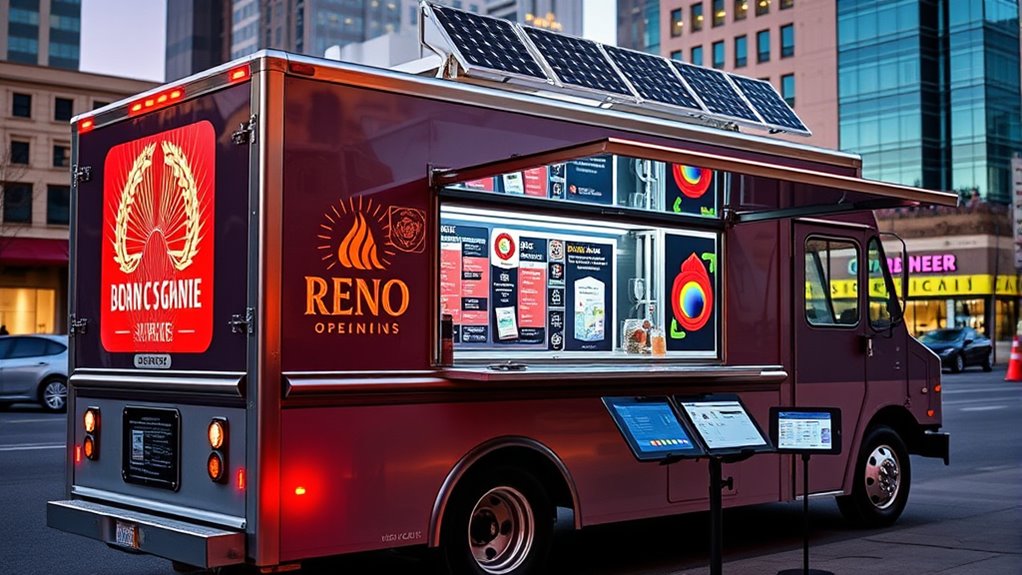
You’ll want to make certain your mobile payment app works seamlessly with your system to keep transactions smooth. Using real-time stock tracking software helps you avoid running out of popular items during busy hours. Investing in these technologies will streamline your operations and improve customer satisfaction. Additionally, being aware of environmentally sustainable practices, such as reducing air pollution from exhaust emissions, can contribute to a more eco-friendly food truck operation.
Mobile Payment App Compatibility
Ensuring your food truck’s payment system is compatible with popular mobile payment apps is essential for smooth customer transactions and efficient operations. By supporting cashless transactions and contactless payments, you cater to customer preferences and speed up service. To achieve this, consider integrating systems like Apple Pay, Google Pay, and Samsung Pay. These options allow customers to pay quickly without fumbling for cash or cards. Additionally, ensure your POS system accepts QR code payments and digital wallets. Compatibility minimizes wait times, increases sales, and improves customer satisfaction. Remember, a seamless payment process encourages repeat business and helps your food truck stay competitive in Reno’s bustling market.
- Accept multiple mobile payment apps
- Enable quick, contactless payments
- Support QR code transactions
- Ensure system security and compliance
Real-Time Stock Tracking Software
Implementing real-time stock tracking software streamlines inventory management by providing instant updates on product levels. This technology helps you stay on top of stock, reducing waste and preventing shortages. With accurate data at your fingertips, you can make informed decisions about reordering supplies, ensuring your food truck always has fresh ingredients. It also enhances supply chain logistics by allowing you to coordinate deliveries more efficiently. You’ll avoid delays caused by stockouts, improve customer satisfaction, and optimize operational flow. Real-time tracking simplifies inventory management, freeing up your time to focus on preparing great food and growing your business. Plus, it offers valuable insights into sales trends, helping you adjust inventory levels proactively. Overall, this software is essential for maintaining smooth, efficient, and profitable food truck operations.
Marketing and Growing Your Presence
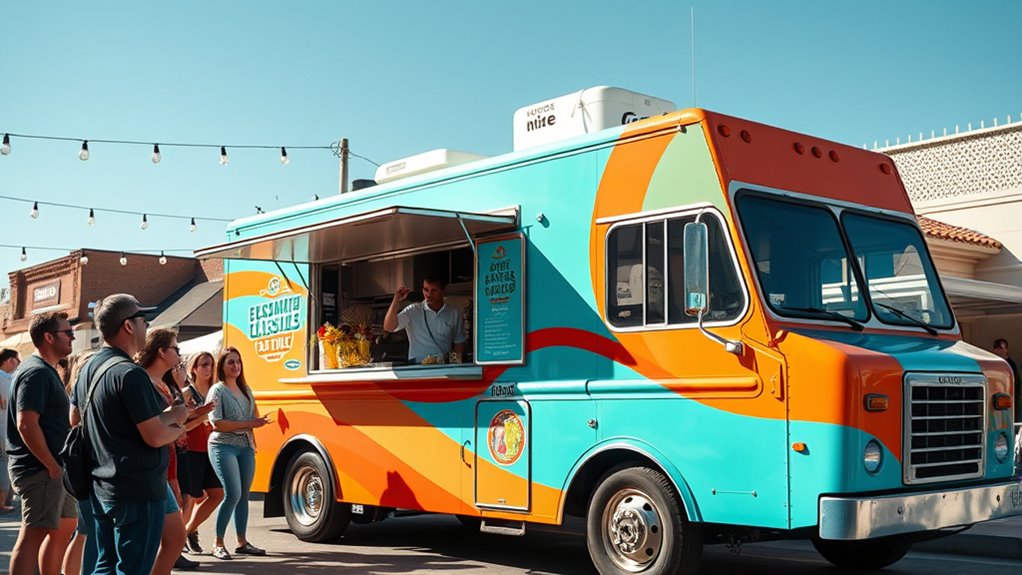
To grow your food truck’s presence, focus on scheduling at popular events and engaging with community activities. Partnering with local organizations and participating in festivals can boost your visibility quickly. These strategies help you connect with more customers and build a loyal following in Reno.
Popular Event Scheduling Tips
Scheduling your food truck events strategically can considerably boost your visibility and attract more customers. By choosing the right times and locations, you strengthen your food truck branding and foster customer loyalty. Planning ahead allows you to target busy weekends, local festivals, and recurring weekly spots, maximizing exposure. Consistency helps customers remember where to find you, building familiarity and trust. Additionally, consider the flow of events; avoid clashing with similar vendors or busy community activities. Use social media to announce your schedule and keep followers engaged. Remember, well-timed appearances keep your brand top of mind and encourage repeat visits. Effective event scheduling ensures you’re not just serving food but creating a memorable experience that keeps customers coming back.
Engaging Community Events and Collaborations
Engaging with community events and forming collaborations can considerably boost your food truck’s visibility and reputation. You should actively pursue community engagement by participating in local festivals, farmers’ markets, and charity events. These opportunities allow you to connect directly with potential customers and showcase your menu. Building event partnerships with organizers and other vendors can create mutually beneficial relationships that attract more foot traffic. Consider sponsoring events or offering special promotions during busy times to increase brand recognition. Collaborating with local businesses or community groups also helps you integrate into Reno’s vibrant food scene. Consistent involvement in community activities demonstrates your commitment and can turn casual customers into loyal supporters, ultimately helping your food truck grow and thrive in the local market.
Local Networking Opportunities Boost Success
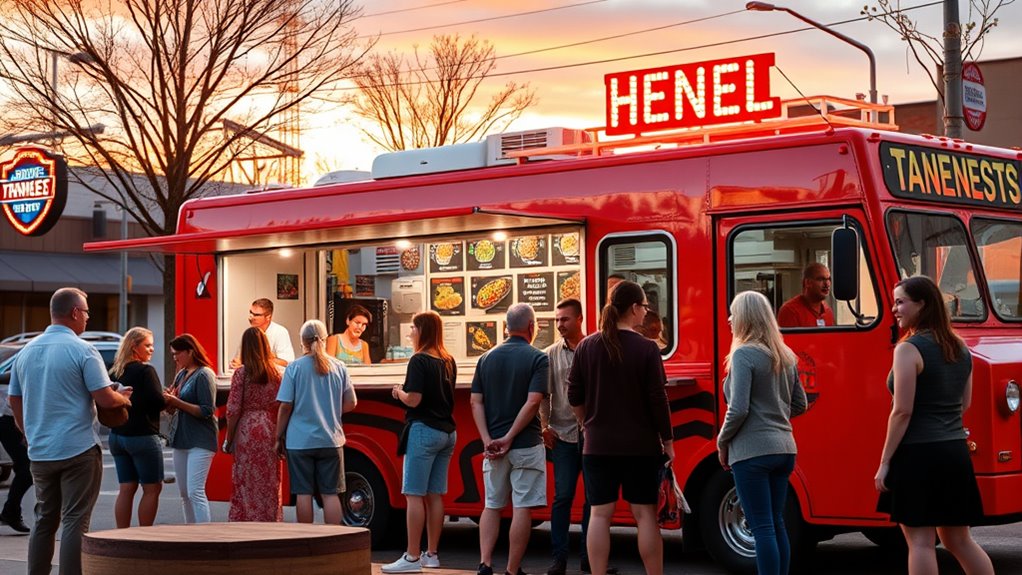
Building strong relationships within the local food scene can considerably boost your food truck’s success in Reno. Connecting with community partnerships and joining local business associations open doors to valuable opportunities. These relationships help you stay informed about local events, gain visibility, and build trust with your audience. Networking also allows you to collaborate with other vendors, share resources, and develop a loyal customer base. Attending industry meetups, participating in local fairs, and engaging with business groups can expand your reach. Forming these connections isn’t just about promotion; it’s about embedding your truck into Reno’s vibrant food community. By actively participating, you’ll create lasting relationships that can lead to repeat customers and new opportunities for growth.
- Attend local business association meetings
- Partner with community organizations
- Participate in Reno food festivals
- Collaborate with other food vendors
Frequently Asked Questions
What Permits Are Required to Operate a Food Truck in Reno?
You need to obtain food truck permits and mobile vendor licensing to operate legally in Reno. Start by applying for a food establishment permit through the Washoe County Health District, which guarantees your truck meets health standards. You’ll also need a mobile vendor license from the city. Make sure to check for any additional permits, like parking or fire safety, to stay compliant and avoid fines while running your food truck.
How Do Seasonal Weather Changes Affect Food Truck Operations?
Seasonal weather changes impact your food truck operations by demanding weather adaptation and seasonal menus. You’ll shift gears from hot, invigorating dishes during summer to warm, comforting meals in winter. You’ll adjust your schedule to avoid harsh weather and guarantee safety. You’ll innovate with seasonal ingredients and menu items that attract customers year-round. Embracing these changes helps you stay competitive, satisfied, and successful, no matter what Reno’s weather brings.
Are There Specific Health Regulations for Mobile Food Vendors in Reno?
In Reno, NV, you need to follow specific health regulations for mobile food vendors. Make certain you meet licensing requirements, including permits from local health departments. You must adhere to food safety protocols, like maintaining proper food storage, sanitation, and temperature control. Regular inspections check your compliance, so staying updated on regulations helps you avoid fines and keep your customers safe while running your food truck smoothly.
What’s the Best Location to Park a Food Truck in Reno?
Think of parking your food truck like finding a prime spot for a picnic—visibility and foot traffic matter most. In Reno, high-traffic areas near the Riverwalk or downtown attract more customers, but you must follow parking regulations to avoid fines. Aim for spots with steady foot traffic where you can set up without blocking access. This way, you maximize sales and keep everything running smoothly.
How Can I Attract Repeat Customers in a Competitive Market?
You can attract repeat customers by building strong customer loyalty through excellent service and quality food. Use social media actively to engage your audience, share daily specials, and showcase your truck’s personality. Encourage feedback and create a loyalty program to reward regulars. Consistently interacting online and offering incentives will keep customers coming back, helping you stand out in Reno’s competitive food truck scene.
Conclusion
Starting a food truck in Reno is like planting a seed that can grow into a thriving enterprise. By understanding local trends, nailing down permits, and creating a mouthwatering menu, you’re setting yourself up for success. Stay adaptable, embrace the community, and let your passion be the engine that drives you forward. With dedication and a bit of grit, you’ll turn your food truck dream into a flavorful reality rolling through Reno’s vibrant streets.
